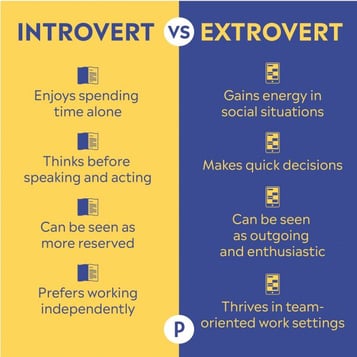At Lead Belay, we believe three things are necessary to be an effective leader, but none of them are being extroverted. It turns out, you don’t need to be extroverted to be a leader. In fact, many of the best leaders aren’t.
An extroverted personality is not required to be a good leader
At Lead Belay, we believe three things are necessary to be an effective leader:
- A growth mindset: A will to grow and invest in yourself.
- Self-awareness: Understanding of yourself and how you relate to others.
- Empathy: Even just some empathy is enough.
What’s not included in those three things? You might notice we don’t include things like public speaking abilities, a gregarious personality, or loving to be the center of attention. It turns out, you don’t need to be extroverted to be a leader. In fact, many of the best leaders aren’t.
The two personalities
There are several definitions of what it means to be extroverted. Myers-Briggs tells us extroverts are people who prefer to focus their energy outwards, and who receive energy back from other people, things, and situations. More commonly, extroverts are thought of as people who are outgoing, have big personalities, or like being in large groups.
But no matter how you define it, none of those things make a person a great leader. Similarly, not having any of those things far from excludes you from being one. In almost every case, someone who is quiet, contemplative, and/or gets no energy from group settings can still be a great leader, as long as they are willing to use their strengths to their best advantage and show up in ways that other people need them
One thing leadership does require is a lot of human interaction. Depending on an individual's leadership style, this can come in verbal and non-verbal forms of interaction and communication. For introverts, this is where finding and knowing your strengths comes into play.
Maybe you’re not excited to be the center of attention in large meetings. But someone on
your team may love it. Let that person take the lead during team meetings, while ensuring you still show effective leadership during one-on-one conversations.
If you find that at the end of each day you’re exhausted from human interaction, schedule time to be by yourself each day and recharge.
Where extroverts can fall short
In many instances, introverts may find their introversion is appreciated by their team. Extroverts have a tendency to spend too much time in meetings, talking about things that don’t matter, or even over-talking about things that do. Because they get energy from a group environment, they drive down into every detail and come up with more and more reasons for interactions, while everyone else might just want to get to work. Good leadership is about clear and effective communication, so extroverts can fall short in this regard.
Sometimes, being extroverted can even be a hindrance to great leadership. If an extrovert loves all the attention, they may not be particularly interested in listening to members of their team. If they’ve traditionally taken charge in group settings, they may not see and understand how other people’s strengths can best help the team as a whole.
The leader’s job, for either personality type
Great leaders do more listening than talking. They dig deep to find the strengths and weaknesses of the members of their team, and discover ways to help them flourish. Your job as a great leader is to get others to be their best, not just to be a mirror of you. And none of that requires one type of personality over another.
So whatever your personal strengths and differences may be, find them and be aware of them. Recognize their shadow sides, and how that might create blind spots for you and your team so you can avoid them. From there, find the right balance for you and your team.
That team dynamic may morph over time. Managing people is hard, but not because it’s about right or wrong decisions. It’s about balance, and that matters whether it’s managing your team’s tasks and expectations, or discerning what meetings would work as just emails.
At Lead Belay, we believe that a lot of the qualities people think they need to fit the common definition of a leader aren’t actually the qualities necessary to make a real difference and change. And we stand for anyone with a willingness to grow and change to become a leader.



